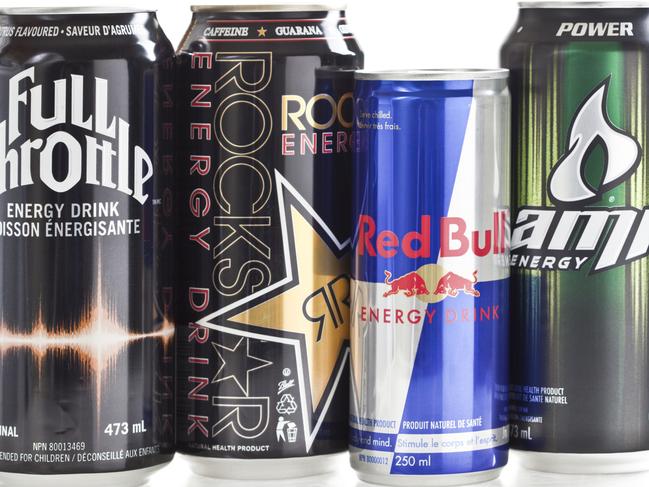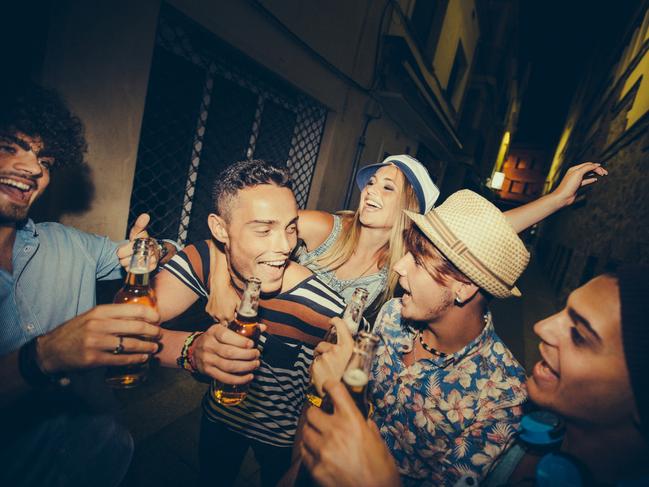Mixing booze and energy drinks could be ‘deadly’, study reveals
MIXING energy drinks and alcohol on a big night out is being blamed for a rise in sudden deaths and health emergencies, new research reveals.
Illness
Don't miss out on the headlines from Illness. Followed categories will be added to My News.
ENERGY drinks have been implicated in sudden deaths, a surge in calls to poison lines and now we can reveal four in 10 young Aussies are at risk because they mix the caffeinated drinks with alcohol.
Two Sax Institute surveys, totalling 3200 young people in NSW, found 40 per cent of 18-24-year-olds were mixing energy drinks with alcohol and the majority exceeded the recommended intake of two standard 250ml energy drinks per day.
Worse still, the practice of mixing the drinks is promoting high risk alcohol consumption, the research found.
This is because the stimulation provided by the caffeine in the energy drinks counteracts the sedative effects of alcohol allowing people to stay awake and consume more alcohol over a much longer period, says La Trobe University researcher Dr Amy Pennay.

Some people in the study who mixed the drinks consumed over nine alcoholic drinks in a session, which is four times the recommended daily intake of two alcohol drinks per day.
They also drank, on average, three energy drinks which is fifty per cent more than the recommended two 250ml energy drinks per day specified in Australian guidelines.
Researcher Dr Amy Pennay said it is not uncommon for people planning a big night out to consume up to 10 Jaeger Bombs where a herbal liqueur is mixed with a large shot of energy drink.
“Emergency departments have seen a rise in the number of alcohol mixed with energy drink presentations over the last decade,” she said.
People who combine alcohol and energy drinks can experience heart palpitations, tremors, insomnia, visual disturbances and nausea, she said.
Energy drinks have also been implicated several deaths in Australia and many more overseas.
A Perth man died of caffeine toxicity in 2014 after consuming four energy drinks a day and earlier this year a teenage girl died after consuming what appeared to be a mix of alcohol and energy drinks.
There were 300 calls relating to caffeinated energy drinks made to the NSW Poisons Information Centre between 2004 and 2010, 128 of which resulted in hospitalisation.

The UK government recently moved to ban the sale of Red Bull, Monster Energy and other energy drinks to children in England.
The Cancer Council and other health groups in Australia have warned they are fuelling the nation’s obesity crisis because of their high sugar content.
Dr Pennay said it is not enough is being done to educate people about the dangers of energy drinks says policy makers should consider banning energy drinks sold in bottles that contain more than one 250ml serving per bottle.
“Large servings of energy drinks in excess of the intake guidelines – such as pints or jugs – should be prohibited,” the study said.
Western Australia liquor laws bans the sale of drinks that mix alcohol and energy drinks after midnight but it is the only state to do so.
Foundation of Alcohol Research and Education chief Michael Thorn says his organisation believes the mixing of alcohol and energy drinks should be banned on licensed premises because they do result in deaths.
Australian Beverages Council CEO Geoff Parker said Australia has some of the most stringent regulations on energy drinks in the world.
“These laws require all brands to limit the caffeine content to 32mg per 100mL, which is equivalent to a cup of instant coffee,” he said.
“Like any mixed drink, clearly the amount of alcohol consumed is the main issue, not the amount of mixer consumed,” he said.
The Australian Beverages Council opposes suggestions of regulatory restrictions on the sale of any non-alcoholic beverages, including energy drinks, in favour of highly successful existing self-regulation.
Global evidence on alcohol and energy drink consumption has repeatedly found that consuming both does not lead to more alcohol being consumed nor does it somehow mask the effects of intoxication or increase risk-taking behaviour, he said.
